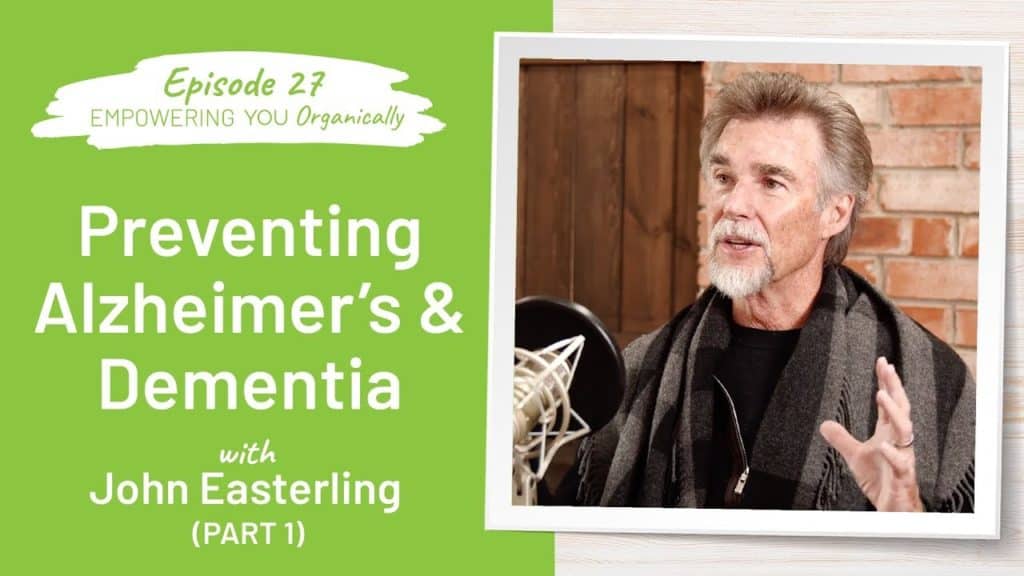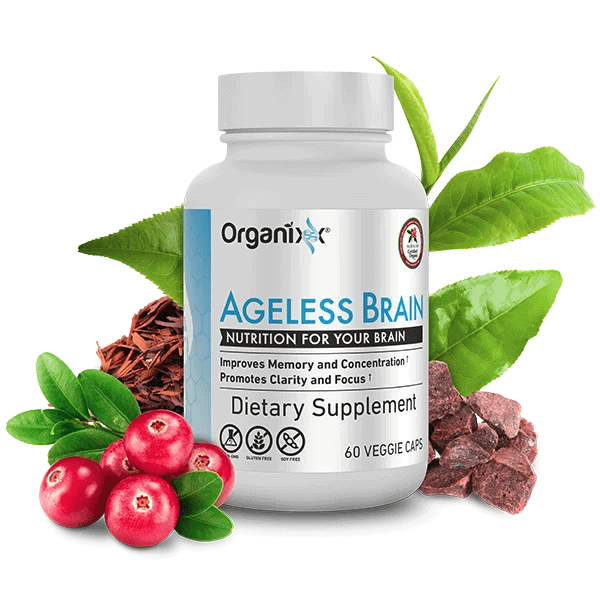Empowering you Organically – Season 4 – Episode 27
Title: The Secrets for Optimal Brain Health with Amazon John Easterling
Hosts: Jonathan Hunsaker & TeriAnn Trevenen
Guest: “Amazon” John Easterling, Plant Medicine Formulator
Description: We’re talking brain health this week! And we have a treat for you! “Amazon” John Easterling, Plant Medicine Formulator joins us in the studio to share his story. Tune in to learn how he found a passion in plant medicine. We also dig into brain health and the causes of Alzheimer’s and dementia.
* * *
FEATURED PRODUCT
- 8 brain-boosting botanicals sourced from the Amazon rainforest
- Helps maintain healthy brain inflammation levels
- Encourages new brain cell growth
- Supports healthy neurons for better memory power
- Protects the brain from free radical damage
- Aids healthy blood flow and oxygen levels
- Promotes a calm, focused mind and balanced moods
* * *
ABOUT “AMAZON JOHN” EASTERLING
Since 1976 John Easterling has been an explorer and treasure hunter in the Amazon Rainforest. It was there, after a personal health crisis, he was introduced to the traditional use of medicinal plants by the Indigenous People in Peru.
Since then his passion for plant medicine has only accelerated.
Easterling’s original degree is in Environmental Studies, he founded the Amazon Herb Company in 1990 and serves on the board of the Amazon Center of Environmental Education and Research.
Amazon John’s 28 years of Plant Medicine experience have been profiled on TV and Radio including “Good Morning America” and “Fox and Friends”. His product formulations have sold over $100 million worldwide.
John has been featured in two PBS documentaries, World News Report “Amazon John and Rainforest Medicines” and Jean Michel Cousteau’s “Return to the Amazon.”
Easterling believes the dramatic growth and interest in plant medicine is still in its early stages and will continue to significantly improve life experiences and healthy outcomes into the future.
Evolution of a Treasure Hunter
- Went down to Ecuador and down into Peru, with a passion for finding lost cities of gold, essentially a treasure hunter. Was making his living with some of that material, and then some artifacts.
- Next, into Brazil, Uruguay, and Argentina with gemstones, and took that on as treasure.
- Then later going up the river in the Amazon rainforest, he was trading in blowguns and carved monkey bones, and a variety of tribal artifacts and became ill.
- This is where his passion for plant medicine was ignited. The natives brewed a special tea from local plants. This not only improved his illness but he actually felt better than ever before in his life.
- This is where the Amazon Herb Company was born and has helped people improve their health with plant medicine for 30 years.
How Amazon John Came to Focus on Brain Health
- Through research of diseases with Doctors he found eight major areas where everyone is affected, and almost every specific challenge falls within these categories:
- Immune System
- Primary Digestion
- Secondary Digestion (Metabolism)
- Energy Circulation
- Calming & Stress Related Issues
- Hormonal Balancing
- Inflammatory Issues (pain, sewelling)
- Blood Sugar Balancing
- The issues with Alzheimer’s and dementia, when you look at the statistics, as I’ve really gotten into more recently, it is really shocking. It is startling. I was surprised at a lot of the data that I saw.
- The incidence of death from heart disease in the last 15 years has actually declined by about 11%. The deaths due to Alzheimer’s have increased 123%.
Alzheimer’s and Dementia by the Numbers
“The issues with Alzheimer’s and dementia, when you look at the statistics, as I’ve really gotten into more recently, it is really shocking. It is startling. I was surprised at a lot of the data that I saw.”
- People over 65, one in 10 have Alzheimer’s dementia.
- Deaths of people over 65 years old, one out of three of those deaths will be due to Alzheimer’s. Actually, more people are dying of Alzheimer’s than prostate cancer and breast cancer combined.
- And the cost is 270 billion dollars now. It’s expected to go to 1.4 trillion over the next few years.
- The Center of Disease Control said that this could break the entire health system.
Signs of Alzheimer’s and Dementia
People may experience:
- Cognitive: mental decline, difficulty thinking and understanding, confusion in the evening hours, delusion, disorientation, forgetfulness, making things up, mental confusion, difficulty concentrating, inability to create new memories, inability to do simple math, or inability to recognize common things
- Behavioral: aggression, agitation, difficulty with self care, irritability, meaningless repetition of own words, personality changes, restlessness, lack of restraint, or wandering and getting lost
- Mood: anger, apathy, general discontent, loneliness, or mood swings
- Psychological: depression, hallucinations, or paranoia
- Also common: inability to combine muscle movements, jumbled speech, or loss of appetite
Causes of Alzheimer’s and Dementia
- Beta amyloid plaquing.
- “So when you get plaquing, your spark plug would foul, and you couldn’t start your engine. So same thing here. You get that plaquing in there, and it just can’t transmit to the next one, and you don’t remember. You can’t access that data where you put your keys.”
- Tau tangle, where you get the neurons that really just become tangled.
- Inflammation is a really big deal, and actually these other factors are really caused by it. It’s a kind of inflammatory response from your brain to protect itself sometimes, developing this amyloid plaquing to seal off what it sees as an insult.
- Involvement of Candida in brain issues.
- Recent research showed was that people did not think before that the Candida could cross the blood brain barrier. Now they found that it actually can.
- It travels through your body doing that, looking for a place to reside where the biological terrain is right. If you introduce a lot of sugar and a lot of carbs into that terrain, they really love that.
- When these Candida cross that blood brain barrier, the brain recognizes that as an insult, and then you have this coating process. The brain will try to coat that to seal it off.
Prevention
- Lifestyle and diet – low sugar, more green vegetables
- Probiotics after a course of antibiotics – maintain a diverse colony-forming units of probiotics.
- Maintain healthy inflammation levels throughout the body.
- Exercise – improves the microcirculation to the brain.
- Sleep – get quality sleep each night (7-9 hours).
- Lower your exposure to environmental toxins.
Brain Health – Supplementation and Diet
- Polyphenols – Many of the health benefits associated with polyphenols may be related to their role as antioxidants. Antioxidants are known for their ability to combat cell damage.
- Anthocyanins – Powerful antioxidants – the red/blue/violet phytonutrients responsible for the vibrant pigmentation of many berries and vegetables.
- Brain-derived neurotrophic factor – several botanicals that help stimulate; una de gato, cat’s claw
- Cacao – can slow down the process of brain cells dying.
- Cinnamon – cinnamaldehyde, has been shown to slow down, to break down amyloid plaquing, and help dissolve the tau tangles.
* * *
Subscribe to Empowering You Organically
Never miss an episode!
APPLE PODCASTS SPOTIFY GOOGLE PODCASTS
–
Episode 27 – The Secrets for Optimal Brain Health with Amazon John Easterling






